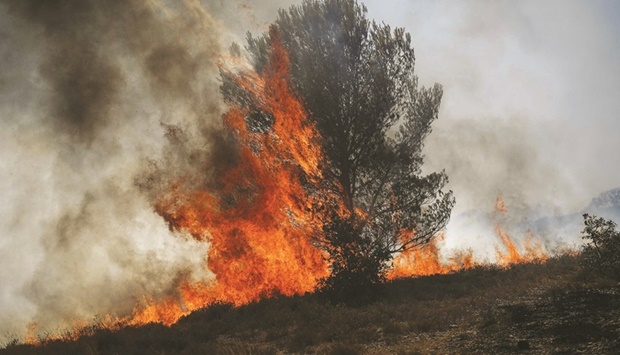Hundreds more people were evacuated from their homes as wildfires blistered land in France, Spain and Portugal yesterday, while officials in Europe issued health warnings for the heatwave in the coming days.
More than 1,000 firefighters, supported by water-bomber aircraft, have battled since Tuesday to control two blazes in southwestern France that have been fanned by scorching heat, tinder-box conditions and strong winds.
While temperatures dipped a little in Portugal, they were still expected to top 40° Celsius (104° Fahrenheit) in some places, with five districts on red alert and more than 1,000 firefighters tackling 17 wildfires, authorities said.
In Spain, a new wildfire broke out in the south of the country after blazes in the west in the past week.
More than 400 people were evacuated from the hills of Mijas, a town popular with northern European tourists in the province of Malaga.
Beachgoers in Torremolinos, some 20km away, could see plumes of smoke rising above the hotels lining the coast.
Meanwhile, the worst drought in over 70 years reduced Italy’s longest river, the Po, to little more than a trickle in places, with temperatures expected to rise next week.
Officials are worried about the effects on people’s health and on healthcare systems already challenged by the coronavirus (Covid-19) pandemic as the searing heat sweeps the continent, with warnings issued for worse to come in Britain in particular.
The World Meteorological Organisation (WMO) said the heatwave would worsen air quality, especially in towns and cities.
“The stable and stagnant atmosphere acts as a lid to trap atmospheric pollutants, including particulate matter,” Lorenzo Labrador, WMO scientific officer, told a Geneva press briefing. “These result in a degradation of air quality and adverse health effects, particularly for vulnerable people.”
Portuguese Health Minister Marta Temido said on Thursday that the health system faced a “particularly worrying” week due to the heatwave and said some hospitals were overwhelmed.
From July 7 to July 13, Portugal registered 238 excess deaths due to the heatwave, the country’s DGS health authority said.
Spain registered 84 excess deaths attributable to extreme temperatures in the first three days of the heatwave, according to the National Epidemiology Centre’s database.
Britain’s weather forecaster issued its first red “extreme heat” warning for parts of England on Monday and Tuesday.
“Exceptional, perhaps record-breaking temperatures are likely early next week,” Met Office Chief Meteorologist Paul Gundersen said.
“Nights are also likely to be exceptionally warm, especially in urban areas,” he said. “This is likely to lead to widespread impacts on people and infrastructure.”
The highest recorded temperature in Britain was 38.7C (101.7F) recorded in Cambridge on July 25, 2019.
Hannah Cloke of Britain’s University of Reading, said the heatwave showed climate change was here and there was an urgent need to adapt.
“We are seeing these problems now and they are going to get worse. We need to do something now,” she told Reuters. “It’s harder to cope with these types of temperatures in the UK because we’re just not used to them.”
In Portugal, the highest temperature on Thursday was recorded in the northern town of Pinhao at 47C (116.6F), just below the record.
Raymond Loadwick, 73, a retiree from Britain now living in the Portuguese district of Leiria, had to leave his home with his dog Jackson when flames started to burn down a hill packed with highly flammable eucalyptus and pine trees on Tuesday.
When he returned a day later, his white house stood untouched but the vegetation around it had turned to ashes and his fruit trees were burned down.
Loadwick is scared fires will happen more often in the future.
“You have to be on your guard,” he told Reuters.
In France’s Gironde region, more than 11,300 people have been evacuated since the wildfires broke out around Dune du Pilat and Landiras.
Some 7,350 hectares (18,000 acres) of land have been burnt.
Authorities said the fires had not yet been stabilised.
In Dune du Pilat is Europe’s tallest sand dune and a magnet for tourists.
“I’ve never seen this before and you get the feeling that it’s post-apocalyptic really,” said resident Karyn on Thursday shortly before the preventative evacuation order of the village of Cazaux near Dune du Pilat.
Nobody has been hurt in the fires which had not been extinguished as of yesterday.
“The blazes are still not under control, and unfortunately conditions are windy again,” firefighter spokesman Matthieu Jomain told AFP.
Elsewhere in Spain, the wildfires that have been burning in parts of Extremadura, which borders Portugal, and the central Castille and Leon region forced the evacuation of four more small villages late on Thursday and yesterday.
The flames are now threatening a 16th century monastery and a national park.
Several hundred people have been evacuated since the fires started and 7,500 hectares of forest have been destroyed in the two regions.
In Catalonia in the northeast, authorities suspended camping and sporting activities around 275 towns and villages to prevent fire risks and restricted farm work involving machinery
The Irish meteorological issued a nationwide weather warning for tomorrow, Monday and Tuesday with “exceptionally warm weather” and daytime temperatures of 25C to 30C expected.
A high of 32C was possible on Monday, Met Eireann said, just short of Ireland’s record high 33.3C set in 1887.
Belgian authorities said they, too, expected much higher temperatures next week, with a possible high of 38C in some parts of the country forecast for Tuesday.
Scientists said there was little doubt that heatwaves were caused by global warming and would become regular occurrences.
“Climate change is driving this heatwave, just as it is driving every heatwave now,” said Friederike Otto, Senior Lecturer in Climate Science at the Grantham Institute at Imperial College London. “Greenhouse gas emissions, from burning fossil fuels like coal, gas and oil, are making heatwaves hotter, longer-lasting and more frequent.”

A tree burns yesterday during a wildfire in Tarascon, southeastern France.
